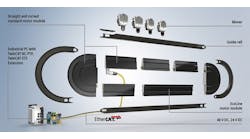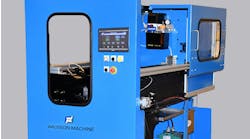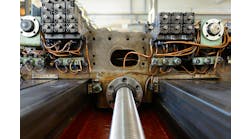So I quickly read an email summary of a paper where researchers from Ball State and Villanova universities suggested that the fear of automation could be affecting workers' physical and mental health.
Really? Maybe it's because I'm a Purdue University graduate, but I think, if you just change the words “robot” and “automation” in the study to any one of about a thousand different things, you would get the same results. I'm biased, right?
It kind of reminds me of the fake emails many used to get that sounded real and appeared to be written by an important official, so it caused worrisome thoughts. Those unwitting felt compelled to forward it to 10 of their friends, including me. Later, some of your friends, or just me, emailed you back to inform you it's not real.
To me and my biased opinion that automation is great, the wide data ranges quoted in the study doesn't look much better than a guess, or I think, in the study's case, a poor estimate. I guess I could purchase the study to get the important facts and data before providing my informed, biased opinion.
Actually, never mind. I don’t really care, even if the study is real or maybe flawed. Instead, I’ll give workers in manufacturing the benefit of the doubt; I’m sure they are much stronger than the study may suggest, and we should help those who are not.
But the basic study data I saw left out how many workers with existing mental problems they lumped into the results. That’s probably 10% out of the gate, and that doesn’t include the crybabies, whiners and subpar workers who often cause mentally draining problems, poor health and physical distress—all on their own. It's automatic.
So I call BS on the study. Don’t let a narrow-minded study strap you to the idea that you are an automation victim. That puts the focus on being a victim instead of looking to your future. It almost seems like the study's purpose is to hold back automation and advancement opportunities. There is no value in keeping an old, dead end job with little chance for advancement, or a great one if it may be replaced by automation. The value is looking to the future; looking at what it will likely offer; and then planning for it.
The study sure seemed like it was just supporting regulations, or how about taxes, on automation, which I’ll personally make sure doesn’t happen—kind of like now. Maybe I should have read it carefully, but it wouldn't matter, considering my automation bias.
The study will just help to label the automation victim a victim in the future.
The time spent on any study promoting a narrative that automation is ready to take over half of our jobs just seems like political garbage to me. Automation will happen, but it will take a long time. Automation will create other jobs, so you should prepare starting now.
Perhaps the researchers could append the study with recommendations on how to create an automationless safe space and a fear-of-automation cry closet. It could be part of the plan to increase work breaks and worker pay. Oh, but wait, that will just highlight the failure in following the right path and cause automation to increase faster.
Instead, those experiencing physical and mental health issues should talk to your doctor or therapist about how to take steps to make your career automation-proof. These costs will also help the researchers show that the study data is accurate.
To help with this solution, I recommend the creators of the study stop emailing it to me, multiple times, and instead throw it in the trash, because my bias makes me think it is trash and is causing me health issues—it's making me sick.
The researchers could do a real, valuable new study on how potential-automation-displaced workers can plan for a suitable employment future and how to not fear change. But that probably won’t happen because that isn’t the researchers' agenda or purpose.
It sounds like the professors are looking for problems instead of offering solutions. As a manager of engineers, there is nothing worse than sitting in a meeting listening to a guy whine about problems while never offering a solution. And, sorry, there will not be many successful safe spaces from automation in real-life manufacturing. As an adult you just need to learn to deal with it.
I can predict the future a bit. Many jobs are going away or will change and advance. Instead of getting sick about it or making it a problem, get off you current path; adjust it; and advance your skills. At this time I cannot see a successful future where you can hide in a safe space instead.
Go for the skilled trades, engineering or high-tech digital—higher skills, less door greeter, retail, sales and food service—as a possible path. After remodeling my bathroom, I have a very high regard for carpenters, electricians, plumbers, drywall finishers, painters and tile installers. It will be quite awhile before robots replace these skilled trades.
Perhaps analytics and artificial intelligence will look at my master bathroom in the future and tell me the best way to upgrade it for highest resale value, but for now I can continue to look through thousands of sample online images or hire an interior designer.
Knowledge will set you free and the automation will demand it. Enjoy that.






